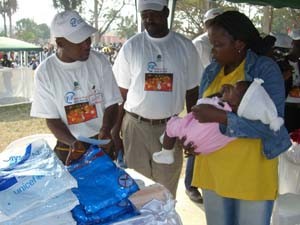
Getting a mosquito net into the hands of a mother in Angola involves numerous steps: the net needs to be manufactured, packaged, shipped, cleared through customs, distributed, and then used properly.
In Angola, net distribution is complex and costly in part because of the difficulty involved in reaching people in remote areas, where roads are poor and formal health facilities are lacking. Under these conditions, innovative distribution mechanisms are needed, such as “piggybacking” them onto other existing public health interventions. In Angola, the President’s Malaria Initiative (PMI) through USAID is doing just that, in close collaboration with several other major partners.
An integrated nationwide campaign was launched, reaching more than 3.5 million children with measles and polio vaccinations, vitamin A, and de-worming medication. The PMI contributed 826,000 nets, which were distributed to children under five in the country’s seven most affected provinces.
The ExxonMobil Foundation was a key partner in the effort. The foundation’s fund helped increase the number of bednets distributed, and supported activities involving local activists to teach residents in the targeted provinces, before, during, and after the campaign about the importance of using nets and how to best hang them.
The preliminary results on net use by children under age 5 are encouraging. A survey conducted four weeks after the campaign, in seven provinces, showed that over 90 percent of the houses surveyed owned nets, and that in 68 percent of the houses a child had slept under the net the previous night.
Susana Mukonda’s story is typical of the reactions Angolans are having to the nets. She said, “After we started using mosquito nets, my children, who are ages 10, 4 and 2, have not had to go to the doctor for malaria. Before, they had malaria often and bad. Today, they use the nets every night for sleeping… Malaria is terrible; it is not a joke. The difference makes me very happy.”







Comment
Make a general inquiry or suggest an improvement.